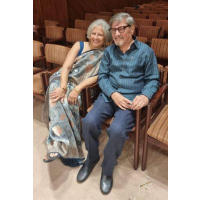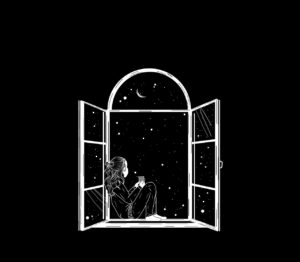
Actor Amol Palekar with his wife Sandhya Gokhale
Mumbai: For Amol Palekar, a well-known theatre and film actor, and director, today is special. It is his 80th birthday and his autobiography in English and Marathi is being released this evening in the National Film Archives in Pune. The best way to celebrate the birthday!
The book is wide in its scope, refers to hundreds of people, and he has written it freely without rancour. It was released in Mumbai last evening by writer and politician Kumar Ketkar at Nehru Centre, followed by a good chat with Satya Saran, former an author and a former editor of Femina, and questions and answers.
Sandhya Gokhale, his Yale-educated lawyer wife, has worked a lot on translating the book into English and doing a lot else to produce it.
Amol is unique, especially in the film world with so many hit films with high quality and yet he is very level-headed, and committed. He takes up social issues and has a mind of his own.
He was a product of the fervent years of the 1960s and 1970s. During the days of protests against the Vietnam War, there was a general social awakening, awareness and struggle to create a better world. Ketkar paid rich tributes to Amol.
Nana Patekar profusely thanked Amol for giving him an important role in his film Thodasa Roomani Ho Jaye. Initially, Amol was against giving him the role as it did not suit the image that Nana had created earlier. But Nana completely changed his style and did a good role. Thodasa Roomani Ho Jayen ( Let’s get a bit romantic) is a 1990 Hindi movie directed by Amol Palekar. It features Anita Kanwar, Nana Patekar, and Vikram Gokhale as major actors. This movie has become a part of management courses and studies pertaining to human behaviour.
Joining in the tributes was Haider Ali, actor and story writer of the film Jodha Akbar, who started life with the TV serial Nukkad.
Amol said he was surprised by the insecurity felt by Rajesh Khanna in a scene with him in a film, even when Khanna was at the height of his popularity. He was also sad at the new trend among film viewers who thought more in terms of money made by a film than its artistic merit.
He also paid rich tributes to director Satyade Dubey from whom he learnt a lot, Badal Sircar, the playwright and others.
Amol is also a painter. Our common friend Sharit Bhowmik, a sociology professor, used to tell me that Amol used to do drawings for the magazine Student Call of St Xavier’s College.
For me, the occasion revived memories of the earliest Marathi experimental plays he did almost fifty years ago which I had seen. Interestingly, he started his theatre career with three Hindi plays directed by Dubey. That also reminds me of an article I wrote for The Hindu when Dubey completed 25 years in theatre. I used a pen name as The Times of India staffers we were not supposed to write in other papers.
*Senior journalist





